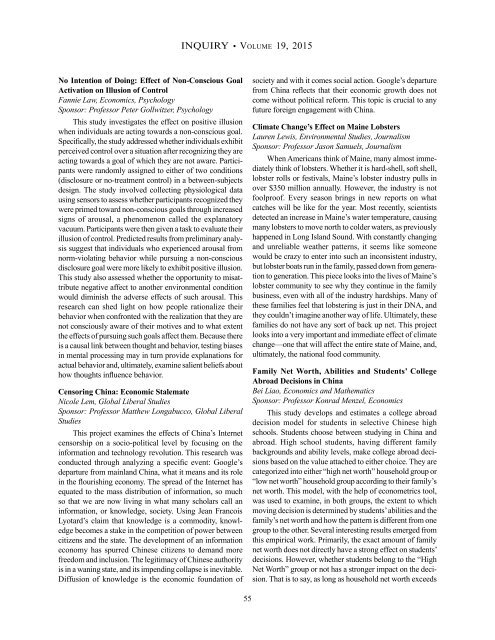INQUIRY
InquiryXIX
InquiryXIX
Create successful ePaper yourself
Turn your PDF publications into a flip-book with our unique Google optimized e-Paper software.
<strong>INQUIRY</strong> • Volume 19, 2015<br />
No Intention of Doing: Effect of Non-Conscious Goal<br />
Activation on Illusion of Control<br />
Fannie Law, Economics, Psychology<br />
Sponsor: Professor Peter Gollwitzer, Psychology<br />
This study investigates the effect on positive illusion<br />
when individuals are acting towards a non-conscious goal.<br />
Specifically, the study addressed whether individuals exhibit<br />
perceived control over a situation after recognizing they are<br />
acting towards a goal of which they are not aware. Participants<br />
were randomly assigned to either of two conditions<br />
(disclosure or no-treatment control) in a between-subjects<br />
design. The study involved collecting physiological data<br />
using sensors to assess whether participants recognized they<br />
were primed toward non-conscious goals through increased<br />
signs of arousal, a phenomenon called the explanatory<br />
vacuum. Participants were then given a task to evaluate their<br />
illusion of control. Predicted results from preliminary analysis<br />
suggest that individuals who experienced arousal from<br />
norm-violating behavior while pursuing a non-conscious<br />
disclosure goal were more likely to exhibit positive illusion.<br />
This study also assessed whether the opportunity to misattribute<br />
negative affect to another environmental condition<br />
would diminish the adverse effects of such arousal. This<br />
research can shed light on how people rationalize their<br />
behavior when confronted with the realization that they are<br />
not consciously aware of their motives and to what extent<br />
the effects of pursuing such goals affect them. Because there<br />
is a causal link between thought and behavior, testing biases<br />
in mental processing may in turn provide explanations for<br />
actual behavior and, ultimately, examine salient beliefs about<br />
how thoughts influence behavior.<br />
Censoring China: Economic Stalemate<br />
Nicole Lem, Global Liberal Studies<br />
Sponsor: Professor Matthew Longabucco, Global Liberal<br />
Studies<br />
This project examines the effects of China’s Internet<br />
censorship on a socio-political level by focusing on the<br />
information and technology revolution. This research was<br />
conducted through analyzing a specific event: Google’s<br />
departure from mainland China, what it means and its role<br />
in the flourishing economy. The spread of the Internet has<br />
equated to the mass distribution of information, so much<br />
so that we are now living in what many scholars call an<br />
information, or knowledge, society. Using Jean Francois<br />
Lyotard’s claim that knowledge is a commodity, knowledge<br />
becomes a stake in the competition of power between<br />
citizens and the state. The development of an information<br />
economy has spurred Chinese citizens to demand more<br />
freedom and inclusion. The legitimacy of Chinese authority<br />
is in a waning state, and its impending collapse is inevitable.<br />
Diffusion of knowledge is the economic foundation of<br />
society and with it comes social action. Google’s departure<br />
from China reflects that their economic growth does not<br />
come without political reform. This topic is crucial to any<br />
future foreign engagement with China.<br />
Climate Change’s Effect on Maine Lobsters<br />
Lauren Lewis, Environmental Studies, Journalism<br />
Sponsor: Professor Jason Samuels, Journalism<br />
When Americans think of Maine, many almost immediately<br />
think of lobsters. Whether it is hard-shell, soft shell,<br />
lobster rolls or festivals, Maine’s lobster industry pulls in<br />
over $350 million annually. However, the industry is not<br />
foolproof. Every season brings in new reports on what<br />
catches will be like for the year. Most recently, scientists<br />
detected an increase in Maine’s water temperature, causing<br />
many lobsters to move north to colder waters, as previously<br />
happened in Long Island Sound. With constantly changing<br />
and unreliable weather patterns, it seems like someone<br />
would be crazy to enter into such an inconsistent industry,<br />
but lobster boats run in the family, passed down from generation<br />
to generation. This piece looks into the lives of Maine’s<br />
lobster community to see why they continue in the family<br />
business, even with all of the industry hardships. Many of<br />
these families feel that lobstering is just in their DNA, and<br />
they couldn’t imagine another way of life. Ultimately, these<br />
families do not have any sort of back up net. This project<br />
looks into a very important and immediate effect of climate<br />
change—one that will affect the entire state of Maine, and,<br />
ultimately, the national food community.<br />
Family Net Worth, Abilities and Students’ College<br />
Abroad Decisions in China<br />
Bei Liao, Economics and Mathematics<br />
Sponsor: Professor Konrad Menzel, Economics<br />
This study develops and estimates a college abroad<br />
decision model for students in selective Chinese high<br />
schools. Students choose between studying in China and<br />
abroad. High school students, having different family<br />
backgrounds and ability levels, make college abroad decisions<br />
based on the value attached to either choice. They are<br />
categorized into either “high net worth” household group or<br />
“low net worth” household group according to their family’s<br />
net worth. This model, with the help of econometrics tool,<br />
was used to examine, in both groups, the extent to which<br />
moving decision is determined by students’ abilities and the<br />
family’s net worth and how the pattern is different from one<br />
group to the other. Several interesting results emerged from<br />
this empirical work. Primarily, the exact amount of family<br />
net worth does not directly have a strong effect on students’<br />
decisions. However, whether students belong to the “High<br />
Net Worth” group or not has a stronger impact on the decision.<br />
That is to say, as long as household net worth exceeds<br />
55


